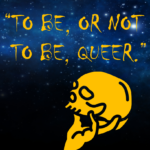Search Result
Sex, gender and sexuality
To be, or not to be, queer
 The meaning of ‘queer’ has changed a lot over recent decades. From being a slur to being reclaimed by some LGBT+ people and being rejected by others. The short answer is that ‘queer’ means different things to different people.
The meaning of ‘queer’ has changed a lot over recent decades. From being a slur to being reclaimed by some LGBT+ people and being rejected by others. The short answer is that ‘queer’ means different things to different people.
There’re lots of reasons why people identify with ‘queer’, either individually or as an umbrella term. It encompasses a wide range of identities and doesn’t risk excluding groups that the acronym may leave out. Some people find queer’s ambiguity appealing since it gives a sense of community without the need for a more specific label. You might be gay, I might be trans – but we’re both queer, and that brings us together.
For some, using ‘queer’ also aims to be an all-inclusive, a unifying umbrella term that includes people who are same-gender attracted and gender diverse as well as the intersections of people and identities within our community. Also, people like it because it’s easy to say and has a whole lot fewer syllables than LGBTIQ and overall, it’s easier to use and remember, especially if this is all new to you.
There are people who dislike the term, mostly due of the fact that it has also been a term that’s used as a slur (a word people use with hate). In the 1960s onwards, people used the word queer as a weapon, usually saying it when attacking or trying to humiliate LGBTIQ people. It wasn’t until the 1980s when activists began to reclaim it, writing it on banners and flags when marching and protesting.
To be or not to be queer | MEN R US
Queer (LGBT+ Glossary | MEN R US

